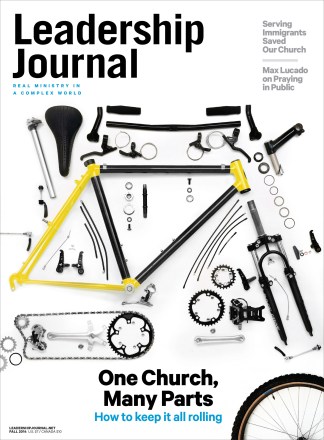These days it can be difficult to navigate issues of gender on church staffs that include women and men. In denying any differences between genders, we reject something intrinsic to the created order that God called good. And yet if we magnify differences between genders, we're in danger of reducing women and men to two-dimensional stereotypes.
To help, I'm pleased to offer a field guide to assist you in determining when to respect traditional gender roles and when to break them.
When it's in everyone's best interest to honor traditional gender roles …
1. Heavy Lifting
When a massive office desk needs to be hoisted up a flight of stairs—one of the little-known, and least-celebrated, duties among most church staffs' unwritten responsibilities—and a male pastor has more measurable muscle-mass than his female counterpart, he is welcome to "use his gifts." (If measuring your male co-worker's muscle mass feels a little strange, just go ahead and assume he's strong enough to move the desk.)
When a massive office desk needs to be hoisted up a flight of stairs, a male pastor is welcome to "use his gifts."
2. Loose Kid in the Staff Meeting
If the active two-year-old child of a couple on staff ends up waddling around the weekly staff meeting, and Daddy doesn't notice that Junior is pouring coffee into the copy machine trays and drawing Sharpie-mustaches on the youth pastor, it's not the worst thing in the world for Mommy to keep an eye on the boy and track along with the meeting. Because she's an awesome multi-tasker. (This was proven on a recent episode of Myth Busters.)
3. Community Travel
When church life imitates family life, it's easy to slip into familiar gender roles. Sometimes the community is best served by simply letting this natural phenomenon play out. For example, if the men who are packing the luggage into vans for a mission trip are gifted with a keen sense of spatial awareness, let them pack! And if the womenfolk are happy to be executing care-giving tasks, like handing out T-shirts and snacks and first aid stuff, let it be. (As a rule, however, use caution whenever using the word "womenfolk." It rarely ends well.)
Use caution whenever using the word "womenfolk." It rarely ends well.
4. Honoring Natural Gifts
At times, church staffs are tempted to overcompensate in matters of gender by costuming a diminutive woman in the senior pastor's size XXL black robe or asking a man on staff to teach sexual purity to middle school girls. That's why it's always in fashion to use common sense!
5. Property Acquisition
Male gender stereotypes include being dominant, aggressive, and not easily influenced. This caveman instinct will not prove useful if your staff is discussing what VBS curriculum to purchase or which musician to hire. However, if your church is in the process of deciding on repairs for the church van or acquiring valuable real estate nearby to expand your ministry facilities, these aren't the worst qualities in the world to have working for you.
Okay, now let's look at the other side of the coin. When it's in everyone's best interest to resist traditional gender roles …
1. Church Kitchen Savvy
Some naively assume that a female staff person fills the same function that the pastor's wife once filled in days of yore: "Queen of the Church Kitchen." Yet when the female staff person does not know how to make a cup of coffee—because there's a Starbucks on the way to the church, that's why!—and she can't distinguish a salad fork from a dinner fork, it may be best to relinquish responsibility of the church kitchen to a willing and able male.
2. Preaching Voice
Some church members express a preference for the sound of the booming male preacher voice. Associating the deep bass voice with the voice of God himself is likely not unrelated to the 1956 film The Ten Commandments, where director Cecil B. Demille cast Charlton Heston to play Moses and to voice the words of God. (Because everyone knows God's a bass.) However, when women do weird things to lower the tone of their voices, and sound like lady-frogs, no one wins. Let those speaking use their regular voices.
3. Passive Silence
One traditional female gender stereotype is passivity. And because church members aren't always privy to what happens at weekly staff meetings, they may not realize how important it is for women on church staffs to speak up. Like when the male youth pastor proposes dipping teenagers in vats of honey and throwing cotton balls at them. Or when another staff member suggests that every member of the church get matching face tattoos. In moments like this, sensible women simply must raise their voices.
If a male staff member makes a mean chicken chili or a savory spinach salad, please (for the love of taste buds) let him lead.
4. Potluck Protocol
Though in many churches women have traditionally prepared and served the iconic "potluck" meal, this job ought not be assigned willy-nilly to women on staff who are not gifted in the culinary arts. So if a male staff member makes a mean chicken chili or a savory spinach salad, or if he can convince church members to bring fewer pasta-and-tuna casseroles, please—for the love of taste buds—let him lead.
5. Strategic Visioning
Traditionally, male leaders have served as vision-casters. And while male vision can tend to be more focused and goal-driven, women often view situations more broadly, keeping in view the needs of those on the periphery. As leaders plan church events—perhaps a church carnival featuring performers walking on glass, flame-throwers, and sword-jugglers in the parking lot—women's gifts might actually be best used as they exercise the kind of peripheral vision that preserves the lives of small children and the elderly.
Now that we've equipped you with all you need to navigate gender issues on a church staff, you're on your own. You're welcome.
Margot Starbuck is ordained in the Presbyterian Church and lives with her family in Durham, North Carolina.
Copyright © 2014 by the author or Christianity Today/Leadership Journal. Click here for reprint information on Leadership Journal.










